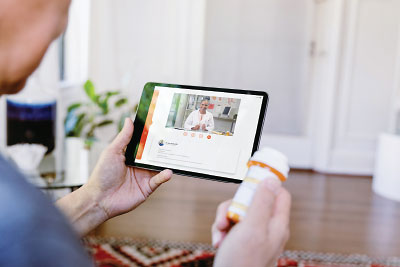APA Introduces Updated Evaluation Guide for Mental Health Apps
Abstract
Though the core design of APA’s mobile app evaluation tool remains the same, the redesigned site includes many new features, including sample reviews of popular apps.

Long before the emergence of GPS, the American Automobile Association (AAA)—with its maps, guides, and roadside services—was a vital resource for travelers navigating America’s highways. APA now has its own AAA tool that the organization hopes will help psychiatrists navigate the complex world of mobile health apps.
The APA App Advisor is an outgrowth of a mobile app evaluator put forth by an APA work group in 2017. The original app evaluator was a five-tier screening tool that physicians could follow to systematically assess variables like an app’s privacy policy, evidence base, data sharing capabilities, ease of use, and cost.
Last December, APA brought together a diverse expert panel to assess the evaluation tool and consider ways to enhance it. The panel included not just psychiatrists but also psychologists, social workers, nurse practitioners, medical students, and people with lived experience of mental illness.
“We wanted to make sure a lot of different voices were heard,” said John Torous, M.D., director of the Digital Psychiatry Division at Beth Israel Deaconess Medical Center and chair of the expert panel. The panel recommended a few tweaks to material in each of the model’s five areas of importance, but Torous noted that overall structure remained intact. “The core principles of the evaluator are the same: Is an app safe? Is it usable? Is it clinically actionable?”
The App Advisor includes several new features. For one, the panel developed an eight-question screening tool to complement the full evaluator. Torous likened it to the Patient Health Questionnaire-9 (PHQ-9), a brief screener to assess for possible depression. “It doesn’t replace a full assessment, but the model screener can help practitioners quickly decide whether an app meets some basic standards to warrant further evaluation,” he said.
The App Advisor website now includes written and video tutorials to discuss the pros and risks of using apps, familiarize users with the evaluation tool, and provide some basics on navigating it. Additionally, the site features example evaluations of 11 popular mental health and well-being apps, conducted by panel members. Torous said the panel plans to continually update the site with further evaluations of mobile health apps that might be relevant to APA members.
Torous emphasized that APA is not offering any endorsement of individual apps with these evaluations. “These evaluations are aimed at giving psychiatrists a sense of what to look for when reviewing an app so they can make the most informed decision for their patient and practice,” he said.
“We hope that our updated App Advisor shows that APA is committed to staying active in the digital mental health space,” Torous continued. “We want to be the trusted resource psychiatrists can turn to when they have questions about the ever-evolving digital health landscape.” ■
The APA App Advisor is posted here.



